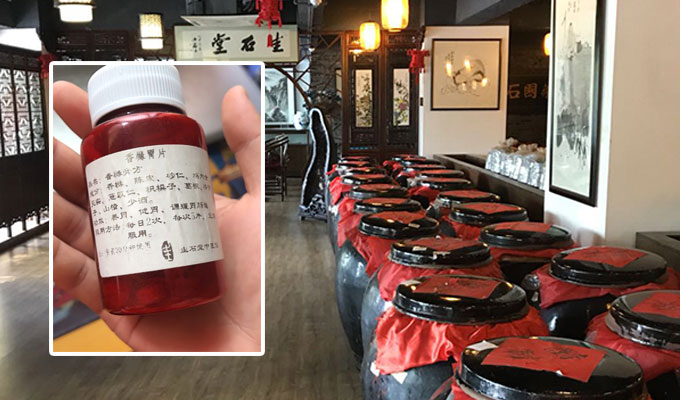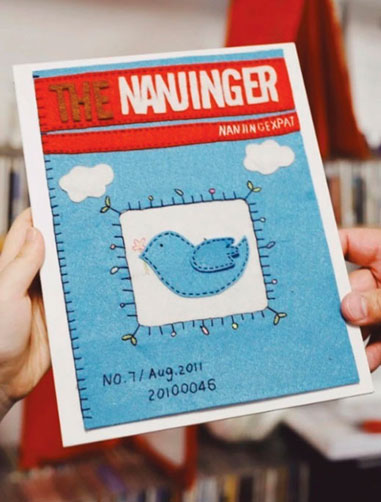Nanjing’s latest string of arrests, in connection to the production and commercialisation of counterfeit drugs, has revealed an alarming underbelly of uncontrollable fakers. Recently, one such group, detained in December, has been released on bail, a move which has locals divided over the apparent impossibility to regulate the production of TCM (Traditional Chinese Medicine).
This particular investigation highlights a new 2017 law; “Chinese Medicine Law” in which is found “The lawful Administration of Filing the Preparation of Traditional Chinese Medicine for Medical Institutions Using Traditional Processes” that has already begun to rock the TCM boat.
Qian Hui, 46, is the person in charge of a Chinese medicine shop in Nanjing’s Qinhuai district called Gui Shitang. An investigation into the shop began in November, whereby the Nanjing Qinhuai Police Department, together with the Qinhuai District Market Supervision Administration, found numerous large ceramic barrels of Chinese medicine brewing alongside cancer remedies, medicines to treat cardiovascular diseases, insomnia and much more, with some medicines selling for ¥3,000.
In the original report by Shanghai news outlet The Paper, it was revealed that, “Qianmou, who claimed to be a ‘famous medical descendant’, had previously been a doctor, is now not even qualified to practice medicine”. Qian also boasts to have over “100 years of cancer treatment” success, in addition to its “ancestral secret”.
“Our Chinese medicines are not harmful to society and human health… After we were detained, some patients also [helped us] explain the efficacy of the drugs to related departments. We hope that Gui Shitang can resume business”, Qian said.
None of the medicine sold by Gui Shitang had been approved by the State Drug Administration, thus after the new law went into effect, it rendered the medicine counterfeit or “fake”. Qian reportedly told Xinhua news that over the past 3 years more than 2,000 patients have received treatment at the Gui Shitang, and that the shop had an annual turnover amounting to ¥10 million.
Reader comments about the case say the punishment is too light and question whether the detainees should have been able to make bail at all, while others vehemently defend Chinese medicine and the inability to compare and conduct modern tests.
“Western medicine, antibiotics and chemicals have become more and more ineffective, and more and more side-effects have been discovered. Therefore, many researches in post-modern countries are desperately studying traditional Chinese”, writes Mini North Nose.
“When the Chinese medicine is present in the world, where is the drug management law not known? Traditional Chinese medicine is private and not suitable for open testing. Being able to cure diseases is a good medicine, and the patient has the final say”, commented Far Dream.
“Why is it that there are always black-hearted businessmen who use the name of traditional Chinese medicine to deceive people? The reputation of Chinese medicine has been ruined by these locusts”, said Kim.
“Personally, my humble opinion: The behaviour of this TCM pavilion is seen in the laws and regulations of the “Chinese Medicine Law” and other laws. It should be handled as an administrative violation. If we look at the police’s delinquency standards, I am afraid that in the whole country, more than half of the medical practitioners and clinic doctors in the country have to be arrested. The next trend is worthy of attention”, says another reader.
In December 2017, police detained 11 people including doctors and shareholders. On the 28th day of the same month, all suspects made bail. Earlier in the year, three people were arrested in Hong Kong for producing, trafficking and selling fake Chinese herbal pills and balm; replicas of Hong Kong products, that they sold for half the price.
“About 3,500 boxes and 500 bottles of counterfeit proprietary Chinese medicine with an estimated street value of HK$500,000 (US$64,100) were seized at the warehouse and retail outlets… The five suspects, all from Hong Kong and aged between 29 and 54, were released on bail”, reported Clifford Lo for the South China Morning Post.
Despite the challenges, the government has committed itself to the cause of Traditional Chinese Medicine. Back in November, the Nanjing municipal government announced the “Development Plan of Traditional Chinese Medicine (TCM) in Nanjing from 2017 to 2030”. By 2020, it is planned that all towns, hospitals and community health services, as well as over 95 percent of village clinics in Nanjing will have access to TCM services.
In China the “faking” of food and medicine is rife, with such stories surfacing frequently. Therefore, it is understandable that the government is under pressure to enforce stricter rules and regulations. A nationwide standardisation of the production of Chinese Traditional Medicine is thus going to prove difficult and will inevitably come up against opposition.











